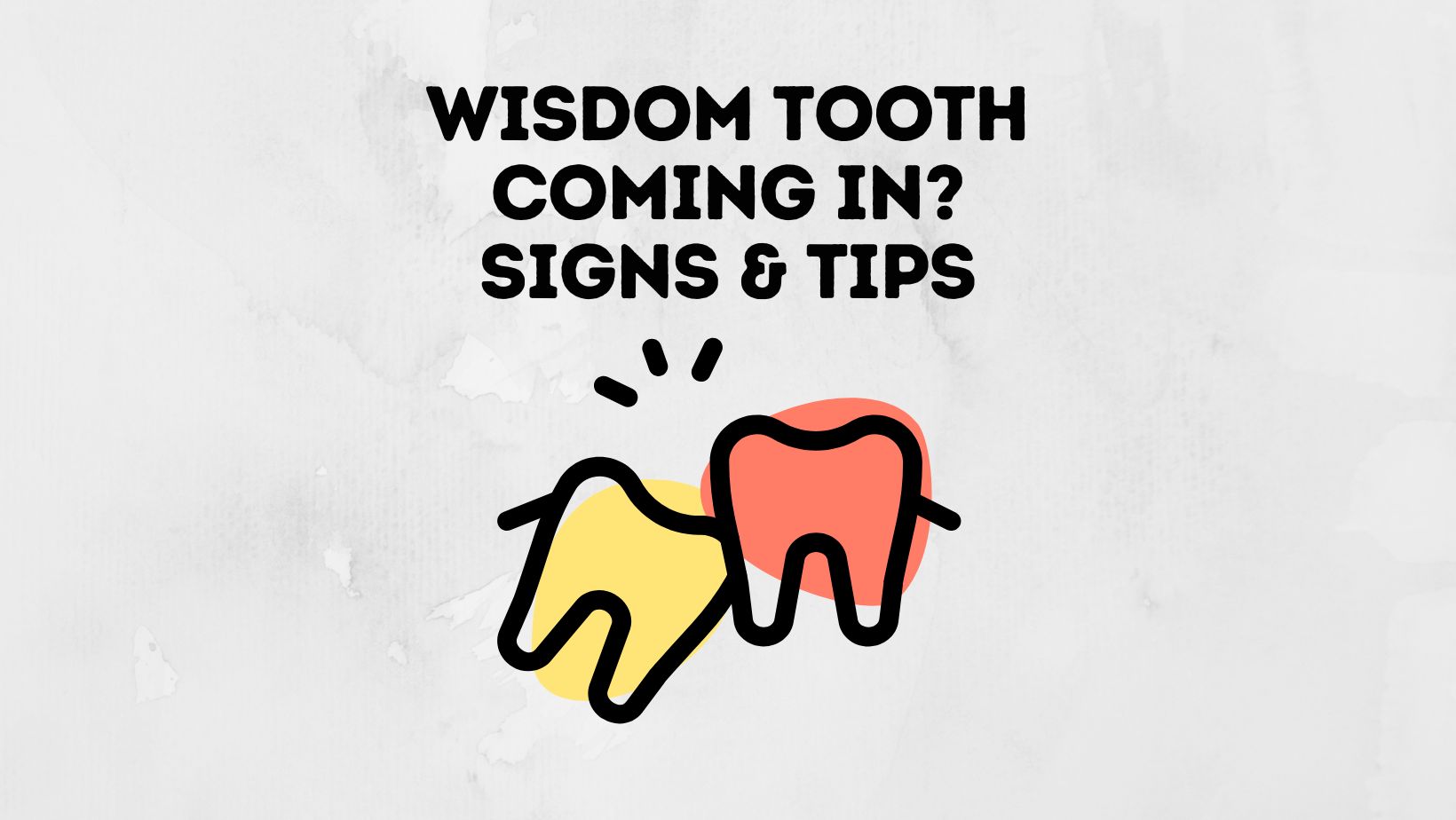
Looking for Signs & Symptoms of Wisdom Teeth? In your late teens or through your twenties, you may experience some kind of pain or discomfort in your back molars. Are you? Well, if yes, then you aren’t alone but one amongst the millions of others who are dealing with their Wisdom Teeth arrival.
Wisdom teeth, or third molars, are the last teeth to emerge, and they are the most painful for a maximum of us. While some individuals may never experience any discomfort with their Wisdom teeth emerging, others may experience a hell lot of pain.
Wisdom teeth usually emerge anytime between the age of 17 to 25 years. For some individuals, Wisdom teeth may emerge during their late 20s as well. The signs and symptoms of a wisdom tooth coming can differ for every individual. Some people suffer from acute pain and can have difficulty even opening their mouths. In contrast, others may experience a mild discomfort and swelling or, in fact, no discomfort at all while their Wisdom tooth is coming out.
This article is all about learning and discussing Common Signs & Symptoms of Wisdom Teeth. These signs may not be applicable to all, but a large group audience can definitely relate to them.
In addition, we will also explore necessary tips to manage the discomfort of Wisdom teeth. If you are somewhere around is dealing with the Wisdom Teeth Eruption process, make sure you get the most out of all the valuable information below. Let’s get started.
Table of Contents
What is Wisdom Tooth? Why do we have Wisdom Teeth?
Wisdom teeth are an additional pair, perhaps the third and final set of molars. It typically appears on the back end of your teeth set. Wisdom tooth appears either during late adolescence or early adulthood, but most probably before the 30s.
These set of teeth, though, doesn’t serve any specific purpose, but they assist in chewing and grinding food effectively. Back in the past, when our ancestors had a diet of coarse diet, Wisdom teeth were necessary for effective chewing.
However, as our diet evolved, human jaws became smaller, and the necessity for Wisdom teeth decreased. Dr.Stevenlin Says Our modern diets lack Vitamin K2, a nutrient that is responsible for the development and growth of our jaw.
For most people who have a smaller jaw, Wisdom teeth can cause a lot of problems while emerging. Oral health issues, including overcrowding, impaction, and infection, are common for a lot of individuals.
As a result, a lot of individuals choose Wisdom tooth extraction to get rid of their discomfort and pain permanently. However, for many, Wisdom teeth will come out without any discomfort and not even make the individual realize it.
A dentist can monitor the growth and development of Wisdom teeth and determine the treatment further. For some, a few painkillers may help, but for others, an extraction becomes necessary.

Signs & Symptoms of Wisdom Tooth Coming Out
If you are experiencing any of these signs and symptoms, your Wisdom tooth or teeth are possibly coming out.
- As the Wisdom tooth emerges, the individual may experience light to acute pain and discomfort on the back of their jaw. It may also lead to swelling around the gums as a result of infection or inflammation. The inflammation of the surrounding tissues can also make the individual experience difficulty in opening the mouth.
- As wisdom teeth start emerging, it can lead to stiffness in the jaw due to pressure on the jawbone.
- Wisdom tooth due to overcrowding in the jaw can also lead to chewing difficulty. The individual may experience some pain while eating, even with the softest food item.
- As the Wisdom tooth emerges, it pushes through the gum leading to redness, tenderness, and swelling in that area. Some individuals may also experience gum bleeding with acute pain.
- If the infection or inflammation is in the surrounding area, the individual may also experience headaches while the emergence of Wisdom teeth.
- Wisdom teeth lead to referred pain, and the pain may travel toward the ears as well. It happens due to nerve involvement in our head structure.
- Some individuals experience pressure or sinus problem if Wisdom teeth emerge in the upper jaw.
- Wisdom teeth create small spaces between the teeth and gums, and it may lead to bacteria accumulation. This, as a result, can cause bad breath in some individuals.
- Sometimes Wisdom teeth can lead to Gum recession and expose the roots of adjacent teeth. It may further lead to temperature sensitivity.
- Wisdom teeth emergence, in some rare cases, can also cause Cysts or Tumors leading to swelling and pain.
- Increased infection and inflammation in the gum (due to Wisdom teeth emergence) can, in a few cases, result in swollen lymph nodes in the neck.

Why do Wisdom Teeth cause pain?
Wisdom Teeth are painful, but have you ever wondered why? There are a variety of reasons that associate pain and discomfort with the emergence of Wisdom teeth.
One of the common reasons among them is lesser room for tooth growth. Since most individuals have shorter gum as the Wisdom tooth emerges, it causes pressure on the jaw resulting in pain.
In addition, it can also lead to inflammation and swelling around the teeth in the gums. Similarly, some Wisdom teeth are unable to fully emerge from the gum line and become impacted. As the impacted teeth pressurize the gum, it results in discomfort, pain, bacterial build-up, and pain.
The pain caused due to Wisdom Teeth can also be a result of decay or infection and nerve compression. Since Wisdom teeth are on the back end of the mouth, cleaning them can sometimes prove tricky. This may lead to cavity development resulting in decay, infection, along with pain and discomfort.
Tips for managing the pain of Wisdom Teeth
The pain of Wisdom Teeth’s arrival can be acute, and therefore managing it at times can be a challenge.
However, here are some tips and tricks that will help you to promote healing and alleviate pain. For instance:
- Use ice packs on your cheeks to reduce swelling and soothe the pain of Wisdom teeth. Do some ice compressing for 5 to 10 minutes multiple times a day for help.
- Take a glass of lukewarm water (temperature suitable to rinse your mouth) and mix ½ teaspoon of salt into it. Now take the water into your mouth and swish it around gently for half to 1 minute and later spit it out. Do these 3 to 4 times in one session, and it will reduce swelling and promote healing.
- Avoid hard and crunchy food, and eat as much soft food as you can. Include soup, mashed potatoes, yogurt, and more such options in your diet.
- Take over-the-counter pain relievers to soothe the pain of Wisdom teeth. However, before taking any kind of medicine (even the over-the-counter ones), consult your dentist.
In case the Wisdom Teeth arrival is making you experience severe pain, bleeding, or other such symptoms, reach your dentist right away.
Extracting Wisdom Teeth: Do all Wisdom Tooth needs to be removed?
Extracting Wisdom teeth is a very common practice today, but not every Wisdom tooth needs to be removed.
The removal of Wisdom teeth or a particular tooth depends upon a range of factors. The size and shape of the jaw, the orientation of the teeth, the positioning of the teeth, how much time is it taking to emerge fully, and the individuals’ overall oral health helps in deciding whether their Wisdom teeth need an extraction or not.
Wisdom teeth that are partially emerged or impacted need to be extracted. If not removed, such teeth can lead to pain, infection, decay, and damage to the gums and surrounding teeth. An extraction procedure will prevent any further complications.
It is typically the dentist who can best suggest whether your Wisdom teeth need an extraction or not. The dentist or oral surgeon may perform some medical examinations to determine the best course of treatment. These examinations include:
- Initially, the dentist will perform a clinical examination of the patient’s mouth using a dental mirror, probe, or other specialized instruments. This will help the dentist in determining the Wisdom teeth’s position and condition.
- X-Rays to assess the position and orientation of wisdom teeth. If X-Ray isn’t enough, the concerned medical professional may also perform Cone-beam computed tomography (CBCT) or panoramic scans to get a detailed picture of the Wisdom teeth and their surrounding bones.
- A CT Scan is to get detailed images of the teeth and surrounding bone.
- A Periapical X-Ray to evaluate the root structure of the wisdom teeth. This medical diagnosis also helps in determining whether any infections or cysts are present around the teeth.
Considering the results of the above medical diagnosis, a dentist or oral surgeon will determine whether medicines can do the job or whether a tooth extraction is necessary. In some cases, oral surgeons perform a small surgery marking a cut for the Wisdom teeth to come out swiftly. After the examination, the dentist may either recommend the extraction of one or two Wisdom teeth or all four of them.
Wrapping up…
The coming of a Wisdom Tooth indicates a lot of signs and symptoms. It is important to monitor the position of the teeth, and the level of discomfort one is experiencing before reaching a dentist. Not every individual may face difficulty while their Wisdom teeth emerge.
However, if you are facing pain, discomfort, swelling, and other complications, consult your dentist or oral surgeon for expert advice. Avoid taking pain relief medicine for a long since it may lessen your tooth pain but can leave you with a range of side effects.

Hi, This is Lyn, I suffer from dental sensitivity for a very long time. PowerToothpaste.com is where I share my views of various toothpaste brands, along with tips on how to use toothpaste and what to look for when purchasing.
